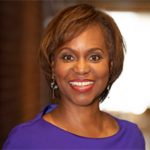(Really) Listening & (Really) Learning

Consider the power of silence. Maybe there’s not been a lot of it in your world lately. Virtual school, remote working, pets craving attention, landscapers or sirens outside your window, the next appointment or thing to do swirling in your mind, and on and on. But silence is powerful. Silence is necessary. It’s what allows us to listen to what’s around us – to pause and reflect. It also allows us to be heard.
Close your eyes. Be silent. And imagine a time when someone stopped and listened to you. When someone heard you. What did they hear? What did they learn? What did you?
At Points of Light, our mission is to inspire, to equip and to mobilize. We’re always talking about action and the many ways people are engaged through the lens of our Civic Circle. But the ability to engage – to take action, to do good – becomes turbo-charged when you listen and learn before you move. Listening and learning helps contextualize your situation, amps up your decision-making ability, provides space for empathy and to see another perspective or point of view.
In this month’s edition of Civic Life Today we’re talking about Listening and Learning. It is a worthy complement to our recent Voice issue, which was all about using our voices. Did you know:
- Humans generally listen at a 25% comprehension rate.
- 85% of all that we know, we have learned through listening.
- We listen at 125-250 words per minute, but we think at 1000-3000 words per minute.
Those stats tell me that we learn so much by listening – but with so much noise, it is easy to understand why and how we can tune others out.
As we heighten our awareness to the benefits and impact of listening and learning, I’m hopeful that these skills will replace our habits of dismissing, cancelling or shouting at each other in echo chambers. I recently watched the eye-opening documentary The Social Dilemma. Then, I recommended it to everyone I know. The movie outlines the ways that – instead of listening to people who may think differently than we do, or who may have new information for us – we seek more of what we know, more of what we believe, and we’ve created our own individual realities and truths online.
Social media has so many powerful, wonderful benefits. But it also allows us to cultivate and curate ideas and beliefs from a circle of people who think just like we do; people who validate rather than challenge our opinions. In an echo chamber, there’s no expansion of our world view, no evolution in how we see it. Instead, there’s how “we” see it and how “they” see it. Every conflict is reduced to false, binary choice.
So, how do we listen? How do we learn? How do we get comfortable with being uncomfortable, so we can have “better” discussions? How do we advocate for those who don’t have a seat at the table, or better yet, pull up a chair and pass the mic for critical conversations? What have we learned recently on matters of race, or gender, or equity and inclusion at work, clean water, poverty, animal rights, or any other issue that concerns us, at home or in our communities? And how do we recognize that choosing not to listen or learn can be viewed as a privilege of a select few. And too often, that choice keeps us running in circles like a little hamster on a precious wheel.
I am so proud of the way the team pulled this month’s edition of the magazine together. There are powerful, introspective pieces in it that enlightened and encouraged me. One article asks a simple yet provocative question: “When was the last time you changed your mind?”
At Points of Light, we will continue to uplift the work of others, equip those who want to do more with powerful tools and strategies, and of course, take action. But before that, we pause to do the most important work, the condition precedent to taking action – to (really) listen… and learn.
Natalye Paquin was the president and chief executive officer of Points of Light from 2017–2022. She is a visionary and results-oriented leader, with more than 20 years of experience providing strategic, operations and fiscal leadership in the nonprofit and public sectors.

